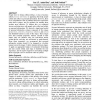Free Online Productivity Tools
i2Speak
i2Symbol
i2OCR
iTex2Img
iWeb2Print
iWeb2Shot
i2Type
iPdf2Split
iPdf2Merge
i2Bopomofo
i2Arabic
i2Style
i2Image
i2PDF
iLatex2Rtf
Sci2ools
CHI
2010
ACM
2010
ACM
A stage-based model of personal informatics systems
People strive to obtain self-knowledge. A class of systems called personal informatics is appearing that help people collect and reflect on personal information. However, there is no comprehensive list of problems that users experience using these systems, and no guidance for making these systems more effective. To address this, we conducted surveys and interviews with people who collect and reflect on personal information. We derived a stage-based model of personal informatics systems composed of five stages (preparation, collection, integration, reflection, and action) and identified barriers in each of the stages. These stages have four essential properties: barriers cascade to later stages; they are iterative; they are user-driven and/or system-driven; and they are uni-faceted or multi-faceted. From these properties, we recommend that personal informatics systems should 1) be designed in a holistic manner across the stages; 2) allow iteration between stages; 3) apply an appropriat...
CHI 2010 | Human Computer Interaction | Personal Informatics | Personal Informatics Systems | Personal Information |
Related Content
| Added | 17 May 2010 |
| Updated | 17 May 2010 |
| Type | Conference |
| Year | 2010 |
| Where | CHI |
| Authors | Ian Li, Anind K. Dey, Jodi Forlizzi |
Comments (0)

